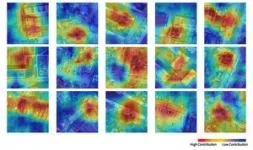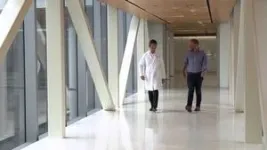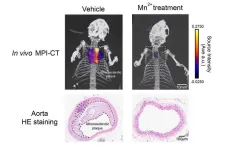(Press-News.org) According to a new paper in Oxford Open Climate Change, published by Oxford University Press, the strategies humanity must pursue to reduce climate change will have to include more than reducing greenhouse gases. This comes from an analysis of climate data led by researcher James Hansen.
Scientists have known since the 1800s that infrared-absorbing (greenhouse) gases warm the Earth’s surface and that the abundance of greenhouse gases changes naturally as well as from human actions. Roger Revelle, who was one of the early scientists to study global warming, wrote in 1965 that industrialization meant that human beings were conducting a “vast geophysical experiment” by burning fossil fuels, which adds carbon dioxide (CO2) to the air. CO2 has now reached levels that have not existed for millions of years.
Climate sensitivity
A long-standing issue concerns how much global temperature will rise for a specified CO2 increase. A 1979 study released by the United States National Academy of Sciences concluded that doubling atmospheric CO2 with ice sheets fixed would likely cause global warming between 1.5 and 4.5° Celsius. This was a large range, and there was additional uncertainty about the delay in warming caused by Earth’s massive ocean. This new paper reevaluates climate sensitivity based on improved paleoclimate data, finding that climate is more sensitive than usually assumed. Their best estimate for doubled CO2 is global warming of 4.8°C, significantly larger than the 3°C best estimate of the United Nations Intergovernmental Panel on Climate Change.
Aerosols
The authors also conclude that much of the expected greenhouse gas warming in the past century has been offset by the cooling effect of human-made aerosols – fine airborne particles. Aerosols have declined in amount since 2010 as a result of reduced air pollution in China and global restrictions on aerosol emissions from ships. This aerosol reduction is good for human health, as particulate air pollution kills several million people per year and adversely affects the health of many more people. However, aerosol reduction is now beginning to unmask greenhouse gas warming that had been hidden by aerosol cooling. The authors have long termed the aerosol cooling a “Faustian bargain” because, as humanity eventually reduces air pollution, payment in the form of increased warming comes due.
Prediction
This new paper predicts that a post-2010 acceleration of global warming will soon be apparent above the level of natural climate variability. The 1970-2010 global warming rate of 0.18°C per decade is predicted to increase to at least 0.27°C per decade during the few decades after 2010. As a result, the 1.5°C global warming level will be passed this decade and the 2°C level will be passed within the following two decades.
Policy
In a final section, Hansen describes his perspective based on decades of experience in trying to affect government policies. First, he believes that achievement of rapid phasedown of CO2 emissions requires a rising domestic carbon fee with a border duty on products from nations without a carbon fee, as well as support of modern nuclear power to complement renewable energies. Second, he argues that the West, which is primarily responsible for climate change, must cooperate with developing nations to help them achieve energy paths consistent with a propitious climate for all. Third, even with these efforts, Hansen believes that global warming will reach levels with dangerous consequences; he argues we should also carry out research and development for temporary, purposeful, actions to address Earth’s now enormous energy imbalance.
A decade ago, Hansen noted that Earth was out of energy balance by 0.6 W/m2 (watts per square meter). There was that much more energy coming in (absorbed sunlight) than going out (heat radiation to space). That excess – which is the proximate cause of global warming – is equivalent to 400,000 Hiroshima atomic bombs per day, with most of that energy going into the ocean. Now, largely because of decreasing aerosols, the imbalance has doubled to about 1.2 W/m2. This huge imbalance is the proximate cause of accelerated global warming and increased melting of polar ice, which is likely to shut down overturning ocean circulations and cause large, rapidly rising, sea level later this century.
The paper argues that such action will be essential to avoid the greater geotransformation that will occur in the absence of such action. Potential actions include injection of stratospheric aerosols, for which volcanoes provide relevant but inadequate test cases, and spraying of salty ocean water by autonomous sail boats in regions susceptible to cloud seeding.
Hansen suggests that young people focus on an underlying problem that has developed in western democracies, especially the United States: “The ideal of one person/one vote has been replaced by one dollar/one vote,” Hansen argued. “Special financial interests – the fossil fuel industry, the chemical industry, the lumber industry, the food industry, for example – are allowed to buy politicians. It is no wonder that climate is running out of control, environmental toxicity is in the process of exterminating insects including pollinators, forests are mismanaged, and agriculture is designed for profit, not for nutrition and the public’s well-being.”
“We live on a planet with a climate characterized by delayed response, which is a recipe for intergenerational injustice,” Hansen continued. “Young people need to understand this situation and the actions needed to assure a bright future for themselves and their children.”
The paper, “Global warming in the pipeline,” will be available (at midnight on November 2nd) at: https://doi.org/10.1093/oxfclm/kgad008.
Direct correspondence to:
James Hansen
Director, Program on Climate Science, Awareness, and Solutions,
Earth Institute at Columbia University
475 Riverside Drive (Room 401-O)
New York, NY 10115
jeh1@columbia.edu
To request a copy of the study, please contact:
Daniel Luzer
daniel.luzer@oup.com
END
Paper argues reducing greenhouse gas emissions is not enough to combat climate change
2023-11-02
ELSE PRESS RELEASES FROM THIS DATE:
Research examines why mask usage in Japan persists
2023-11-02
Osaka, Japan – When you think of Japan in the age of COVID, you might imagine a crowd of people wearing masks. But why do so many Japanese people wear masks?
In an article published this month in the International Journal of Disaster Risk Reduction, a researcher from Osaka University analyzed mask use before and after the government of Japan downgraded the legal status of COVID-19. Results showed that many people continue to wear masks for socio-psychological reasons – including reasons related to ‘relief’ and ‘norm’.
Of course, the obvious motivation for mask use is disease prevention. In the first ...
Exercise therapy based on smart data to improve patients' quality of life
2023-11-02
Regular and moderate physical activity can significantly improve the quality of life of people with internal diseases such as cancer and depression. Unfortunately, many people with internal disorders cannot sufficiently participate in exercise training for several reasons. For example, they often do not have access to appropriate exercise training programs, have a high therapeutic burden, fatigue, or simply no time to engage in physical activity. Accordingly, the Sports Medicine research group led by Professor Perikles Simon at Johannes Gutenberg University Mainz (JGU) investigates how physical activity can be promoted and integrated into patients' daily lives by applying digital tools ...
Alternative antibiotic selection can reduce the risk of healthcare-associated infections for patients with pneumonia
2023-11-02
Arlington, Va. — November 2, 2023 — A new study published today in the American Journal of Infection Control (AJIC) reveals that the use of doxycycline may help protect against Clostridioides difficile (C. diff) infection for some patients with pneumonia. Specifically, study authors found that for hospitalized patients with community-acquired pneumonia who had experienced C. diff infections in the prior year, the use of doxycycline, instead of the more commonly used azithromycin, reduced the development ...
Survey finds most Americans are unaware of many signs that someone is having a seizure
2023-11-02
Orlando, Fla - If you’ve ever seen a movie or TV show in which a character has a seizure, you probably have a fairly standard mental picture of someone falling to the ground in full body convulsions while foaming at the mouth. But that doesn’t necessarily reflect reality. A new national survey by Orlando Health finds that while most Americans recognize those classic symptoms of what’s called a generalized tonic-clonic seizure, the majority fail to recognize the subtle signs, all of which can be dangerous and have a profound ...
A “manganese bullet” targeting the top killer?
2023-11-02
Cardiovascular diseases (CVDs) continue to rank as the top killer in the modern world. This deadly disorder often starts with the buildup of lipid deposits or plaques within the blood vessel, silently setting the stage for atherosclerosis. Rupture of these atherosclerotic plaques, however, could clot blood vessels and lead to life-threatening conditions including heart attack or stroke.
Dyslipidemia, meaning having too much “bad” or atherogenic lipids in the blood, represents the most common cause of CVDs and ...
New NUS study provides insights into early breast cancer development in individuals with BRCA2 mutations
2023-11-02
A pioneering study led by Professor Ashok Venkitaraman from the Cancer Science Institute of Singapore (CSI Singapore) at the National University of Singapore and Dr Mona Shehata from the University of Cambridge (UK) has uncovered vital insights into the distinct effects of BRCA2 mutations on breast tissue cells, shedding light on early breast cancer development in people with BRCA2 mutations. The research was published in the prestigious journal Nature Communications on 25 August 2023.
Breast cancer is a serious concern for individuals with BRCA2 mutations, ...
Clinical intervention directed at social risks does not increase experiences of discrimination
2023-11-02
A growing recognition of the health impact of social risks – such as food insecurity and homelessness – has prompted researchers, healthcare providers and policymakers to consider ways to address these risk factors as part of holistic clinical care. However, some healthcare providers worry the same interventions designed to help patients and families with social risks might also make them feel singled out or like they are otherwise stigmatized.
Now, new results of a rigorous study from the University of Chicago Medicine published October 2023 in JAMA Pediatrics suggest well-designed interventions that address social risks can be provided ...
$13M NIH grant funds research aimed at revitalizing immune systems of older adults
2023-11-02
University of Arizona Health Sciences researchers received a $13.1 million grant from the National Institute on Aging to continue studies aimed at rejuvenating the immune system of older people in order to improve health throughout the lifespan.
Older adults are disproportionally affected by infection, cancer and certain types of autoimmune disease. This is influenced by the fact that as a person ages, their body produces fewer T cells and gets less proficient at maintaining them. T cells are a type of white blood cell essential to the immune ...
Study provides preliminary evidence in favor of a new type 1 diabetes treatment
2023-11-02
Type 1 diabetes is an autoimmune disease that causes the body's immune system to attack and destroy insulin-producing beta cells in the pancreas. Traditional management of type 1 diabetes has primarily involved replacing the missing insulin with injections which, though effective, can be expensive and burdensome. A new study led by researchers at the University of Chicago Medicine and Indiana University suggests that an existing drug could be repurposed to treat type 1 diabetes, potentially reducing dependence on insulin as the sole treatment.
The research centers on a medication known as α-difluoromethylornithine (DFMO), which inhibits an enzyme that plays a key role in cellular ...
New branch of oncology, cancer neuroscience, offers hope for hard-to-treat brain tumors
2023-11-02
Cancer cells hijack normal biological processes, allowing them to multiply. For example, tumors spur construction of new blood vessels, building themselves “highways” to supply nutrients.
Researchers have known about cancer’s blood vessel infiltration for decades, but it was only in the past few years that Stanford Medicine scientists and their colleagues discovered that tumors don’t just tap the body’s highway system; they can also infiltrate and exploit its “telecommunications.”
To ...





